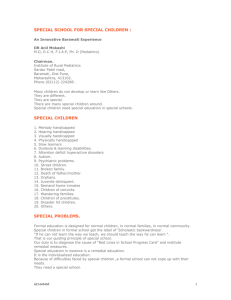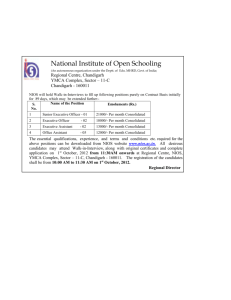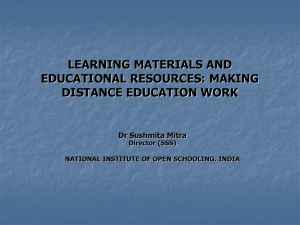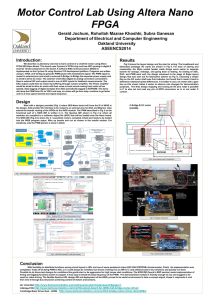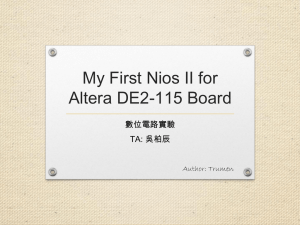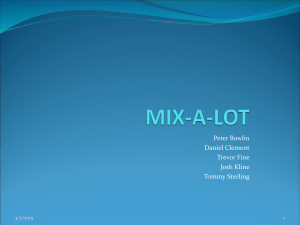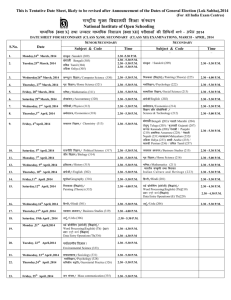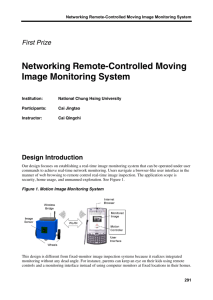(GRPOS) - The National Institute of Open Schooling
advertisement
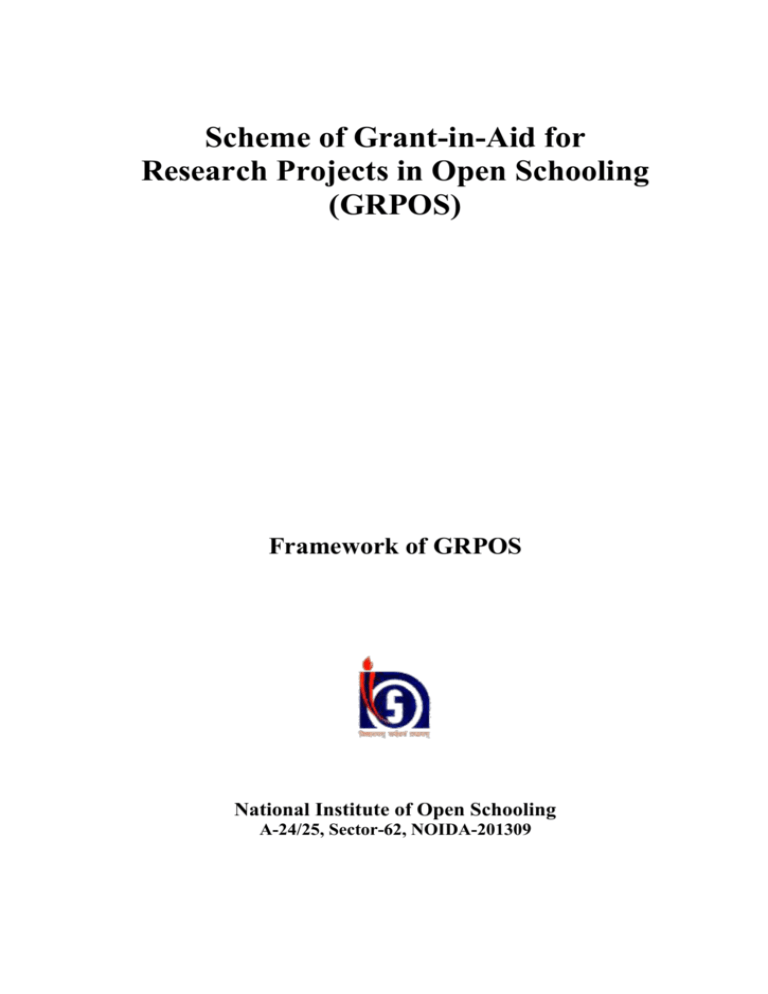
Scheme of Grant-in-Aid for Research Projects in Open Schooling (GRPOS) Framework of GRPOS National Institute of Open Schooling A-24/25, Sector-62, NOIDA-201309 CONTENTS I. NIOS: An Overview 1-4 II. Research in Open Schooling 5-7 III. Scheme of Grant-in-Aid 8-10 IV. Guidelines for Submission of Proposal V. Rights of NIOS in the context of GRPOS VI. Guidelines for Appointment of the Research Personnel 11-13 14 15-16 Annexures 17-22 I Proforma for Research Projects 1.1 Financial Budget: Overview 1.2 Bio-Data of the Principal Investigator 1.3 Certificate by the Head of the Institution for 23 24-25 26 forwarding the Project 1.4 Guidelines for filling in the Proforma for Research 27-29 Project II Agreement Bond 30-31 III Grant-in-Aid Bill 32 IV Proforma for Progress Report of the Research Project 33 1 I. National Institute of Open Schooling (NIOS): An Overview 1.1 Why Open Schooling? The emergence of Open and Distance Learning (ODL) System has been a natural and phenomenal evolution in the history of educational development towards the latter half of the twentieth century. While the conventional system continues to be the mainstream of educational transaction, it has its own limitations with regard to expansion, access, equity and cost effectiveness. Major challenges that India faces today in the educational arena are: the challenge of numbers, the challenge of credibility, and the challenge of quality. The revolution brought about by the growth of Information and Communication Technology (ICT) has greatly facilitated the expansion of Open and Distance Learning (ODL) System and permitted adopting a flexible, constructivist, learner friendly and multiperspective approach to teaching learning process which is so essential for creativity, leadership and scholarship leading to total development of human personality and in responding appropriately to the challenges identified above. The Open and Distance Education is a new paradigm with some elements of shift such as: From classroom to anywhere From teacher centric to learner centric From teacher as an instructor to teacher as a facilitator From mainly oral instructions to technology aided instruction From fixed time to anytime learning From “you learn what we offer” to “we offer what you want to learn”. From education as one time activity to education as life long activity. The concerns for adoption of ‘open schooling’ programmes with the objective of providing “Education to All” include: i. to provide education to those who are unable to attend conventional schools for a variety of socio - economic reasons, as well as to those who for similar reasons missed opportunities to complete school and developmental education, ii. to meet the educational needs of differently abled children, 2 iii. to provide wider choice of educational programmes to learners, iv. to provide a ‘safety net’ to school drop-outs so that they do not remain under-educated. Every region and state of India faces, more or less, the above mentioned educational challenges. 1.2 What is NIOS? NIOS is an “Open School” to cater to the needs of a heterogeneous group of learners at school education level. It was started as a project with in-built flexibilities by the Central Board of Secondary Education (CBSE) in 1979. In 1986, the National Policy on Education suggested the strengthening of Open School System for extending open learning facilities in a phased manner at secondary level all over the country as an independent system with its own curriculum and examination leading to certification. Consequently, the Ministry of Human Resource Development (MHRD), Government of India set up the National Open School (NOS) in November 1989. The pilot project of CBSE on Open School was amalgamated with NOS. The National Open School (NOS) was vested with the authority to register, examine and certify students registered with it up to pre-degree level courses. In July 2002, the Ministry of Human Resource Development amended the nomenclature of the organisation from the National Open School (NOS) to the National Institute of Open Schooling (NIOS). What does NIOS do? The National Institute of Open Schooling (NIOS) provides opportunities to interested learners by making available the following Courses/Programmes of Study through open and distance learning (ODL) mode. Open Basic Education (OBE) Programme for Children (upto 14 years), adolescents and adults at A, B and C levels that are equivalent to classes III, V and VIII of the formal school system. Secondary Education Course Senior Secondary Education Course Vocational Education Courses/Programmes Life Enrichment Programmes The OBE programme envisages schooling by providing a learning continuum based on graded curriculum ensuring quality of education for children, neo3 literates, school drop-outs/left-outs and NFE completers. For implementation of OBE programme, the NIOS has partnership with Agencies providing facilities at their study centres. It is a sort of academic input relationship with partnering agencies. The NIOS provides resource support such as adaptation of NIOS model curricula, study materials, joint certification, orientation of Resource Persons and popularisation of OBE to the voluntary agencies and Zila Saksharta Samities (ZSSs) for implementation of its OBE programme. At the Secondary and Senior Secondary levels, NIOS provides flexibility in the choice of subjects/courses, pace of learning, and transfer of credits from CBSE and State Open Schools to enable learner’s continuation. A learner is extended as many as nine chances to appear in public examinations spread over a period of five years. The credits gained are accumulated till the learner clears required credits for certification. The learning strategies include; learning through printed self-instructional material, audio listening and viewing video programmes, participating in personal contact programme (PCP), and Tutor Marked Assignments (TMA). NIOS offers 26 courses in seven mediums (Hindi, English, Urdu, Marathi, Telugu, Gujarati, Malayalam) for Secondary Examinations and 19 courses in Hindi, English and Urdu mediums for Senior Secondary Examinations. Acknowledging the fact that the young entrepreneurs will be the wealth of the nation, the learner friendly Vocational Education programmes of NIOS provide excellent prospects for the learners. It offers 75 Vocational Education Courses in different areas such as Agriculture, Business and Commerce, Engineering and Technology, Health and Paramedical, Home Science and Hospitality Management, Teacher Training, Computer and IT related sectors, Life Enrichment Programmes and General Services. Knowledge, skills and qualities of entrepreneurship have been made essential components in curricula for Vocational Education with emphasis on practical and on the job training in related industrial units. In order to upscale and place the Open Vocational Education Programme on a sound pedestal, NIOS is seeking collaboration with leading organizations in different educational development sectors like Industries, Medicines, I.T. etc. The NIOS programmes pay special attention towards requirements of the first generation learners, physically, mentally and visually challenged learners and candidates from disadvantaged sections of the society. 1.4 How does NIOS function? NIOS operates through a network of five Departments, eleven Regional Centres and more than 3300 Accredited Institutions (Study Centres) in India and abroad. It has a current enrolment of about 1.6 million students at Secondary and Senior Secondary levels which makes it the largest open schooling system in the world. 4 1.5 Vision and Mission of NIOS Vision The National Institute of Open Schooling, with international recognition and presence, provides access to sustainable and learner-centric quality school education, skill upgradation and training through open and distance learning and ensures convergence of open schooling organizations, resulting in an inclusive learning society, human resource development, national integration and global understanding. MISSION* Mission The National Institute of Open Schooling: Promotes a system of open learning for providing quality education which results in a dynamic inclusive learning society. Provides a dynamic flexible system of open schooling for development of a knowledge society. Acts as a national resource centre to set a proactive role model for learner centric open and distance learning system at school education stage. Develops professional support network using current technologies. Provides education and training for skill upgradation and lifelong learning for all. Provides need based Vocational Education for making the students entrepreneurs and not simply job seekers. Establishes action oriented research for strengthening the Open and Distance Learning System at school level. Achieves excellence in matters such as quality of learning material, student support services, system of assessment and professional development of staff. Identifies and reaches out to prioritised client groups viz., school drop-outs and marginalized groups such as rural youth, urban poor, girls and women, scheduled castes, scheduled tribes, backward classes, minorities, differently abled and ex-servicemen to universalize education. Promotes national integration and integrated development of people. Strives for promotion of open schooling at national and global level through advocacy and consultancy programmes, by providing forum for exchange of ideas and information, and capacity building of open schooling functionaries by way of training and attachment programmes. Undertakes continuous self-assessment and self-improvement for systemic improvement. 5 II. Research in Open Schooling 2.1 Aims and Objectives Amongst the objectives of NIOS, the objectives concerning research are: To undertake research studies, and surveys from time to time, to obtain feedback on the quality of the materials developed, of the facilitation and support offered to students in their study, and on the effectiveness of all the support structures and procedures used by the institution in pursuance of its aim and objects. To identify and promote standards of learning in Distance Education System and Open Schools which may be set up in different parts of the country, through Research & Evaluation and to maintain standards of equivalence with formal system while relating its own distinct character. 2.2 Research will play an important role in planning the future growth of NIOS, establishing its credibility and monitoring the progress being made in its different functional areas. Research will provide direction for deciding the courses to be offered in the future and making modifications in them as and when necessary. Feedback from research and evaluation studies will help in taking corrective action whenever and wherever needed and improving the quality of the courses that are offered for the different client groups. 2.3 The research studies to be undertaken would be planned carefully taking into account the genuine needs and problems. The Research Advisory Committee (RAC) would provide direction for research studies and surveys to be undertaken. Provision will be made for commissioning or farming out research studies. The RAC would help in deciding the studies to be conducted and guide in selection of agencies (institutions, research organizations, NGOs, etc.) to be entrusted with studies on selected topics. It would also have a role in monitoring the quality of research and ensuring that research is done scientifically and the findings of research are trustworthy. More specifically, the Research Advisory Committee (RAC) performs the following roles and functions: To formulate/suggest the thrust areas for research projects. To consider the research proposals from outside institutions/organisations for grant-in-aid and give its recommendations. To consider the research projects formulated by internal faculty members of NIOS. To recommend farming out research projects to outside institutions/organisations as per need. To monitor implementation of the research projects sanctioned by NIOS. To evaluate the outcomes/end products of the research projects sanctioned by NIOS. Any other task assigned by the Chairman, NIOS to the Research Advisory Committee. 6 The RAC consists of eminent educationists from various disciplines and institutions. It comprises of seven eminent educationists nominated by the Chairman of NIOS and all Heads of Departments. The Chairman, NIOS is the Chairperson of RAC. 2.4 RAC recognizes development and testing of alternate methods for admission, curricular inputs, personal contact programme (PCP), management practices, examination, effectiveness of Students Support Services (SSS) and effectiveness of print and non-print materials (audio/video). It also promotes and supports research initiatives of the scholars working within the various departments of NIOS and its constituents. RAC gives importance to research proposals developed under common design and the issues of national importance. These are implemented in collaborative way by institutions located in different parts of the country. However, preference would be given to those proposals, which fall within the priority areas decided by the NIOS from time to time. NIOS will, monitor progress of all research proposals and provide feedback to ensure that the studies proceed in right direction. 2.5 Priority Areas of Research Research programmes, both systemic and discipline based, will be undertaken at institutional level in collaboration with other institutions/organizations. Specific areas for research will be identified. The priority areas in research at NIOS include: 1. Accessibility of Open Schooling System 1.1 Studies on accessibility of NIOS and the constraints both from learner and institutional point of view. 1.2 Studies on critical review of the flexibilities and openness in the Open Schooling System. 2. Courses of Study 2.1 Identification of academic, professional and vocational education courses keeping in view the needs of various target groups, including deprived sections of the society, with the help of survey studies etc. 2.2 Development of course materials, especially with ICT application, and assessing their efficacy through experimental and follow up studies. 2.3 Experimentation on making learning package more self instructional with and without practical components. 2.4 Rational Evaluation and Empirical Evaluation of Self Learning Materials (SLM) with the help of tools for Evaluation of SLM. 3. ICT and Media Research 3.1 Studies on delivery system, use of ICT and different modes of providing instruction when multi-media are used. 4. Teaching and Learning Strategies 4.1 Studies on instructional methods suitable for Open and Distance Learning (ODL), support systems needed to enhance learning and procedures of continuous evaluation to be adopted for monitoring the progress of 7 learners and also for helping them in learning more effectively. 4.2 Studies on efficacy of teaching learning (or self-learning) materials provided to students. 5. Student Support Services 5.1 Augmentation and strengthening of student support services, improvements in the delivery system, decentralization of administration and extensive use of communication systems need to be studied using the experimental and the case study approaches. 5.2 Studies on entry behavior of candidates of ODL system need to be further strengthened. 6. Evaluation of Learners 6.1 Development of formative and summative models for evaluating performance of distance learners with the help of well designed experimental studies. 6.2 Experimentation on alternative models/systems of evaluation based on changing needs and problems of learners under ODL system. 6.3 Evaluative studies pertaining to organization, methods, procedures and results in terms of the learning outcomes of distance learners, and the impact of distance/open education on the socio-economic development of various target groups deserve special attention for planning and policymaking. 6.4 Studies based on analysis of examinations data to assess the quality of questions and to analyse the performance of examinees on different competencies tested by the questions. 6.5 Studies on socio-economic background of learners and analysis of the examination results of different socio-economic groups, caste groups and other disadvantaged groups. 6.6 Studies that compare the performance of pass outs of ODL system with those of formal school system on certain indicators. (Such studies may help in establishing the credibility of the ODL system and also in providing feedback in areas in which improvement is needed). 7. Cost Effectiveness of ODL System 7.1 Studies on per student cost and cost-effectiveness of the ODL system for different types of courses. 8. Study of effectiveness of monitoring and supervision of the NIOS programmes in the Study Centres. 9. Tracer Studies and Other Studies 9.1 Tracer and other follow up studies to find out how the pass outs are employed and, in general, what they are doing and what their views are about the courses completed by them. These are just a few examples of the areas of research. The Research Advisory Committee would suggest some more areas that would be worth including in the li1st of priority areas of research under Open Schooling programme of NIOS. 8 III. Scheme of Grant-in-Aid 3.1 Under its Scheme of Grant-in-Aid for Research Projects in Open Schooling (GRPOS), grant-in-aid will be provided to organizations/institutions which desire to conduct research in the prioritized areas identified by NIOS. 3.2 Eligibility 3.2.1 Financial assistance will be provided to an Institution/Organisation and not to an individual. An organisation refers to a Government body, autonomous organisation, registered Society/Non Governmental Organization (NGO) whose audit is being done regularly. The institution/organisation should have experience in the area of educational research. The head of the institution will act as Ex-officio Project Director. In case the proposal for grant-in-aid is submitted by a University, the Head of the Department concerned may be considered as the Ex-officio Project Director. Given below are the Roles and functions of the Project Director. (i) To monitor progress of the project. (ii) To monitor flow of finances/grants under different project heads. (iii)To get quarterly/half yearly/annual statement of expenditure audited and submit the same to NIOS along with Progress Report (Annexure-IV) (iv) To settle all issues pertaining to finances within three months after completion of the project. (v) To ensure preservation of data generated under the project after its completion for a period of three years. 3.2.2 The Principal Investigator of the Project should be a faculty member of a recognized Institution or registered Society/NGO. A researcher can have only one project of NIOS at any given time. It would be the responsibility of the Principal Investigator and the Institution for total accountability of the project. 3.2.3 NIOS may invite research proposals from its regular internal faculty/officials. The internal faculty/official may submit a proposal to the Head of the Department (HOD) concerned. The HOD should make his/her recommendations on the proposal. If the project is approved, the research work will be carried out by the concerned faculty/official in addition to his/her regular duties. No extra honorarium will be admissible. 3.3 Duration NIOS encourages research projects of maximum of 2-3 years duration. NIOS will not generally encourage external research projects of a budget less than Rs. 20,000 unless quick feedback is required. The quantum of assistance for a research project will depend on the merit of the proposal received. 3.4 Processing of Research Projects: The research projects will be processed by the Research and Development Cell of NIOS. The procedure for processing the projects will be worked out 9 by the Research Advisory Committee (RAC). 3.5 Items for which Grant-in-Aid is Admissible Under GRPOS, grant-in-aid for the following items will be admissible. 3.5.1 Manpower Assistance Depending upon the merit of the project, NIOS may approve and provide assistance to engage one Junior Project Fellow (JPF) during the tenure of the project. The JPF shall not accept or hold any other appointment, paid or otherwise, or receive any emoluments, salary, stipend etc., from any other source during his/her tenure. The Project Fellow will work full time with the Principal Investigator (PI) on the research project. 3.5.2 Honorarium and Allowances to the Project Staff Project Director Principal Investigator Junior Project Fellow (JPF) No Honorarium Honorarium of Rs. 15,000 (Rupees fifteen thousand only) after successful completion of the project of one year or more. Rs. 10,000/- p.m (For NET qualified candidate) Rs.8,000/-p.m(For non-NET candidate) 3.5.3 Hiring Technical Services Technical staff required for the implementation of the project may be hired on a fixed amount for a fixed period on contract basis which should be mentioned in the proposal. Modalities for the utilization of research funds under the head of hiring services are as under: (i) Stenographic services may be hired on contract basis for the purpose of typing of questionnaires/schedules, Reports etc., and not for routine correspondence. For this, a consolidated amount per month for a fixed period of time may be paid. (ii) Skilled/unskilled workers may be engaged on daily wages for field work only and not as peon, attendant, lab attendant, clerk, accountant etc. (iii)Expenditure on payment of consultancy fees etc., shall be admissible under this head, if the payment is made to a person outside the Institution of the Principal Investigator. 3.5.4 Books and Journals The Books and Journals acquired/purchased under the approved research project must be deposited in the library of the institution concerned at the end of the project. These would become institutional property. The expenditure on purchase of books and journals should not generally exceed 5% of the total grant-in-aid for the project. 3.5.5 Contingency (i) The admissible contingency grant may be utilized on xeroxing, typing, stationery, postage, telephone calls, internet, fax, computation and printing needed in connection with the project. Under no circumstances should the amount under this head exceed 10% of the total budget. (ii) The contingency grant is not intended to meet expenditure on furniture 10 etc. Such items are to be provided by the concerned Institution. (iii)Expenditure towards advertisement for the post of research personnel and the audit fee may also be claimed under this head. 3.5.6 Travel and Field Work Modalities for the utilization of research funds under the head “Travel/Field Work” are as follows: (i) The amount allocated under the head Travel/Field Work is to be utilized for implementation of the ongoing project only. This should not be used for attending conferences, seminars, workshops or training etc., which has no linkage with the approved project. The travel/field work is to be undertaken only for data collection within the general scope and sphere of the project. (ii) The mode of travel shall be as per the entitlement of the researcher concerned in the respective institution. Travel by Air and /First AC (by rail) is not admissible. Travel by taxi/own car is permissible within the city where the project is undertaken. If the travel is performed by taxi/own car outside the city, the expenditure would be limited to II AC/Deluxe Bus. Other research personnel shall travel by Rail in sleeper class and ordinary buses. The travel/halting DA and incidentals shall be according to NIOS norms applicable to the Principal Investigator or Research Personnel on the basis of salary/fellowship. The Head of the grantee Institution is not empowered to relax the modalities as detailed above. Non-compliance of the rules shall result in the recovery of the inadmissible expenditure by NIOS from the Institution. The travel expenses under a project should not exceed 15% of the total grant-in-aid for the project. 3.5.7 Institutional Overheads The institution will provide infrastructure facilities such as accommodation/set up for research, library, and laboratory equipments (if required). For ministerial and managerial staff required for the project, provision may be made under overheads (except travel and fieldwork). The overheads will not exceed 5% of the total project cost generally. Only in exceptional cases, it can go upto a maximum of 10%. However, in case of re-appropriation of funds, the allocation towards overheads will remain unchanged. 3.5.8 Re-Appropriation On a case to case basis, NIOS may consider the re-appropriation of funds (among various heads of estimated expenditures) initially allocated for the project subject to the maximum of 10% of the total cost. The grantee Institution should justify the re-appropriation of funds and shall require prior approval of NIOS in this regard. The grant towards fellowship cannot be re-appropriated. 3.5.9 Date of Commencement of the Project The date of release of the first instalment of grant to the institution would be considered as the date of commencement of the project. 11 IV. Guidelines for Submission of Proposal 4.1 Submission of Proposal All proposals need to be routed through the heads of the concerned institutions with a commitment to administer the funds and also be accountable for grants received from NIOS. The academic accountability rests with the faculty/staff who initiates the proposal as a Principal Investigator (PI). The research project can be submitted to NIOS in the prescribed Proforma (Annexure-I) with supporting documents at any time of the year. 4.2 Screening/ Processing of Research Projects NIOS will get the research projects screened/processed with the help of experts drawn from NIOS faculty, members of the Research Advisory Committee and outside experts. The modality of screening the research projects in working groups etc., will be decided by the Chairman, NIOS. If some modifications in a project design are needed, the matter will be referred to the Principal Investigator for modifying the Project by incorporating the suggestions of NIOS. If need be, the Principal Investigator may be invited to come to NIOS for making presentation and giving responses to queries. 4.3 Release of Funds In case a research project is approved by NIOS for grant-in-aid under GRPOS, the grantee institution/organisation will be issued a Sanction Letter mentioning the amount of grant, duration of the project, number of instalments of grant, and other terms and conditions of the grant along with a Proforma for executing an Agreement Bond (Annexure-II). The grantee institution/organisation will be required to submit the Agreement Bond (Annexure-II) duly filled up and signed along with ‘acceptance’ on a copy of the sanction letter. The instalments of grant-in-aid for the Project sanctioned to the grantee institution/organisation will be decided by NIOS. The first instalment of grant will be released upon receipt of (i) Agreement Bond, (ii) Sanction Letter duly acknowledged, and (iii) duly filled in Grantin-Aid Bill (Annexure-III). The institution will maintain a subsidiary account for the grant-in-aid received for the project from NIOS. All expenditure connected with the project are required to be adjusted against various heads given under the project proposal. A token sum can be kept aside for getting the accounts audited by a Chartered Accountant by the grantee institution or it can be adjusted in overheads. 12 The grantee institution is required to submit Quarterly Progress Reports (QPRs) in the Prescribed Proforma (Annexure-IV). Among other things the Progress Report may also include the item-wise expenditure incurred in the first quarter. In subsequent QPRs, item-wise expenditure since the commencement of the project is also to be submitted by the grantee institution/organisation. The subsequent instalments of grants will be released after satisfaction of NIOS that the progress of the project is satisfactory. The last instalment will be released only after acceptance of the final report and receipt of the final accounts duly certified by a Chartered Accountant along with Utilization Certificate by the competent authority of the institute concerned receiving the project grant. NIOS may organize review meetings of the projects which have completed one to two years duration. If need be, the Principal Investigator may be invited for presentation of the work done. The expenditure for attending such meeting may be met out of the project funds. The Review Meetings may take decision about the corrective measures that may be needed and continuation or otherwise of the project. 4.4 Submission of Final Report The grantee institution/organization is required to submit initially three copies of the Draft Report. The draft Report would be got evaluated. NIOS may refer the Draft Report to two outside experts for their comments. Each expert would be paid an honorarium of Rs.2,000/- per report. The Principal Investigator would be required to modify the report on the basis of comments made by the experts. The revised report is to be submitted within three months to the Chairman, NIOS, A-24/25, Institutional Area, Sector62, NOIDA-201309. The grantee institution is requested to submit four copies of the final report in bound hard cover alongwith four copies of the Summary of the Report (2000 to 5000 words) to NIOS. The NIOS will take at its level action about use of the outcomes of the Project. 4.5 Extension of the Project Upon receipt of request (giving justification/reasons for delay in conducting the project) from the grantee Institution, the NIOS may approve extension of time to complete the project. In such case, no additional grant-in-aid would be admissible. 13 4.6 Preservation of Data 4.6.1 The grantee institution shall make suitable arrangement for safe custody of data of the project such as filled in schedules, tabulation or work sheets, tapes, floppies, manuscript of the report etc., for three years after completion of the project. If the scholar associated with the project leaves the institution after a part of sanctioned grant has been received, the grantee institution would have no objection to the project being transferred to a new institution if the NIOS so desires. However, the institution should be responsible for submitting the statement of accounts and utilization certificate of the financial assistance received for the project by that date. 4.6.2 NIOS, however, reserves the right to demand that the raw data, or such part of it as may be specified, shall be transferred to NIOS. 4.6.3 If the institution proposes to destroy the data or otherwise dispose it off, it would do so only after obtaining the approval of NIOS. 4.6.4 The data shall be accessible to bonafide researchers with the permission of NIOS. 4.7 Publication and Copyright 4.7.1The Principal Investigator and the project staff should take prior permission of NIOS for the publication of research papers/articles arising from the research project financed by NIOS. 4.7.2 No data of any research project, for which financial aid has been sanctioned by NIOS, shall be sent or taken out of India or given to any outside scholar or agency without the prior approval of NIOS. 4.7.3 The Final Report of the Research Project would be the property of NIOS. NIOS reserves the right to publish the final report of the research project financed by it. If it decides to do so, the decision would be communicated to the grantee Institution. 4.7.4In all publications, which are based on the projects financed by NIOS, an acknowledgment would be made of the contribution of the professional staff work on the project, and also of the financial assistance received from the NIOS. The publication should bear the following inscription: "The project on which the present report is based was funded by the National Institute of Open Schooling (NIOS). However, the responsibility for the facts stated, opinions expressed, and conclusions reached is entirely that of the Principal Investigator and not of NIOS." 14 V. Rights of NIOS in the context of GRPOS 5.1 Right to Call for Information NIOS may call upon the grantee institution to supply any information or to produce any document necessary to satisfy it about proper utilization of the grant. It may also request the institution, or any other committee specially appointed for the purpose, to hold an enquiry into a specific matter and submit a report to the NIOS. 5.2 Right to direct an officer of NIOS to enquire into the specific issues NIOS may, at any time, depute any of its officers to inspect the accounts and other papers relevant to the grant-in-aid sanctioned to an institution. 5.3 Right to Terminate the Grants If NIOS is not satisfied with the progress of the project or if it finds that rules/norms are being violated, it reserves the right to terminate its grant-inaid for the project. If it is found that the funds have been misused/misutilised and deviated to activities other that the approved items of expenditure, the grantee institution will be liable to refund such misused funds along with interest @18% per annum. 5.4 Right to transfer the project 5.4.1 NIOS reserves the right to transfer the project from one Institute to another. 5.4.2 When the Principal Investigator of a project takes up an appointment in another institution before the project is completed, NIOS may consider to transfer the project to the other institution. 5.4.3 Where, however, a project has been sanctioned to an institution and/or a number of researchers in the institution are involved in the project jointly, transfer of the project to another institution will not be permitted by NIOS. 5.5 Correspondence All correspondence should be addressed to: The Chairman National Institute of Open Schooling A-24/25, Institutional Area, NH-24 Sector-62, NOIDA, District-Gautam Buddha Nagar Pin Code-201309 (Uttar Pradesh), INDIA NIOS Web sites: 1. http://www.nios.ac.in 2. http://www.nos.org 15 VI. Guidelines for Appointment of the Research Personnel 6.1 NIOS may consider appointment of a Junior Project Fellow (JPF) on contract basis for a fixed duration by the grantee institution depending upon the merit and nature of research study. The appointment in any case would not generally be for more than two years. However, as a special case, where the tenure of the project is extended, the fellowship can be extended for a limited period (not beyond one year) with the prior approval of the Chairman, NIOS and after assessing the work to be done by the research personnel. The essential qualifications, amount of fellowship, age, mode of selection and other aspects for the JPF may be strictly followed as per the following guidelines. Junior Project Fellow Essential Qualifications Second class Master Degree with a minimum of 55% marks or equivalent grade in the subject concerned. However, a person having basic knowledge of computer will be given preference. Amount of Fellowship Rs.8,000/-p.m (consolidated) for non-NET candidate and Rs. 10,000/- p.m (consolidated) for NET qualified candidate. Age Should be below 35 years of age. In case of female and SC/ST candidates, the age may be relaxed from 35 years to 40 years. Note: 6.2 If the grantee institution proposes to appoint some retired well qualified person in place of the Junior Project Fellow, the person concerned may be designated as Project Associate and he/she may be paid honorarium upto Rs. 10,000/- per month. However, prior approval of NIOS for such appointment should be obtained from NIOS giving justification and supporting documents (Bio-data, Date of birth etc.) Mode of Selection 6.2.1 The research personnel will be appointed by inviting application through an advertisement or by circulation among Institutions/Universities etc. For this purpose, the head of the grantee institution concerned shall constitute a Selection Committee under his/her Chairmanship and Principal Investigator as the Convener. 16 The constitution of the Selection Committee may be as under: Head of the Institution/Department : Chairperson One subject expert (External, not below : Member the rank of Reader) One expert in the field of Education : Member (External, not below the rank of Reader) Principal Investigator : Member Convener Three Members, including one expert (External), will constitute the quorum. The Fellowship to the research personnel may be disbursed after obtaining approval of NIOS on sending the following information duly signed by the Principal Investigator and Registrar/Head of the grantee Institution to NIOS immediately after the person is selected for the post: Proceedings of the Selection Committee. Appointment order. Attested copies of testimonials. Joining report. The external experts invited for selection of the research personnel may be paid actual local conveyance subject to the limit of one-day DA of the city concerned as per NIOS norms. 6.3 Terms and Conditions for the Research Personnel 6.3.1 The Research Person is entitled to leave for a maximum period of thirty days per year in addition to general public holidays. He/she is not entitled to vacations e.g., summer, winter and pooja vacations. However, women JPF would be eligible for maternity leave at full rates for a period not exceeding one hundred and thirty five days once during the tenure, in case a project is of minimum two years duration. In case a project of duration less than two years, women awardees would be eligible for maternity leave for a maximum period of thirty days pending which appointment shall be automatically terminated. 6.3.2 The JPF will not accept or hold any appointment paid or otherwise or receive any emoluments, salary, stipend, other fellowships etc., from any other source during the tenure on the Project sanctioned by NIOS to the grantee institution. 6.3.3 The fellowship may be terminated at any time without assigning reasons and the decision of NIOS in this regard shall be final. 17 Annexure-I National Institute of Open Schooling (NIOS) Scheme of Grant-in-Aid for Research Projects in Open Schooling (GRPOS) Proforma for Research Projects 1. Title of the Project : 2. Name of the Institution/Organisation applying for grant -Full Address (with PIN code) : -Telephone No. -Fax No. 3. Duration of the Project : ……………. Months 3.1 Proposed date of commencement 3.2 Target Date of completion : : 4. 4.1 Details of the Project Need and Justification (State the purpose precisely) 4.2 Specific objectives (Emanating from the purpose) 18 4.3 Methodology* _______________________________________________________________________________________ * While filling in the Proforma, the Guidelines given in Annexure 1.4 may, please, be kept in view. The methodology of conducting the Project may be mentioned in detail keeping in view the guidelines. Among other things, it should include details of research design, the modality of collecting information and method of providing meaning to the collected data. As mentioned in the Guidelines, the information related to (i) approach, (ii) coverage, (iii) major variables for data collection, (iv) tools to be used, (v) activity schedule, (vi) case study, (vii) field visits, and (viii) seminar/workshops may be included as per nature and need of the project. 19 4.4 Phasing of the Project* S. No. Activities 1. 2. Duration From 3. To 4. Estimated Expenditure (in Rupees) Remarks, if any 5. 6. Total * Under Phasing of the Project, please include all significant activities that are to be organised while conducting the project. There may be two types of activities: (i) Activities on which expenditure is to be made out of the project funds, and (ii) Activities not needing finances. Please mention all such activities in a chronological order. Please also include under Item No. 4.4 information about honorarium to the Project Fellow, estimated expenditure on contingencies, travelling expenses etc. The estimated expenditure on contingencies may not exceed 10% of the total budget; and the expenditure on TA/DA for project work may not exceed 10% of the total budget. 20 4.5 Details of Budget of each Activity under item No. 4.4 in the following Format If there is more than one activity involving expenditure on workshop, meeting, seminar, conference, purchase of equipment etc., then mention the estimated expenditure under items 4.5.2: 4.5.3: 4.5.4 etc., on the pattern of item No. 4.5.1 given below. 4.5.1 Activity No.__________________ (From 4.4) Title of the Activity Duration: From ________To_________ S. No. Items of Expenditure 1. 2. Estimated Expenditure 3. Total: 21 Remarks, if any 4. 5. Collaborating Agencies, if any S. No. 1. Name of the Agency 2. Nature of Collaboration 3. 6. Human Resource It may include information about the Principal Investigator, other faculty if involved, and the Project Fellow, if needed. S. No. 1. 7. Name 2. Designation 3. At what stage? 4. Stage of Education to which the Programme/Project is meant: Primary/Middle/Secondary/Senior Secondary/Out of School Population Groups. Any other (Please specify) 22 Duration of Involvement From To 5. 6. Remarks, if any 7. 8. Beneficiaries Learners/Teachers/Teacher Educators/ Principals/Educational Planners and Administrators/ Coordinators of Study Centres/Academic Facilitators. Any other (Please specify) 9. Excepted Outcome (Publication etc. emanating from the Project) 10. Plans for utilization and dissemination of end product/outcome 11. Name and Designation of the Principal Investigator Signature of the Head of the Institution/Organisation (Project Director) Name Designation Full Address Signature of the Principal Investigator Date:_______________ Date:______________ 23 Name Designation Full Address Annexure 1.1 Financial Budget: Overview PROPOSED ITEMS OF EXPENDITURE Staff Monthly Honorarium (in Rupees) I. Honorarium to Project Staff 1. Junior Project Fellow 2. Technical staff 3. Secretarial Staff Total Other Items of Expenditure II. Field Work and Travel III.Stationery, Printing, Photocopying, Postage etc. IV. Any other Item (Please specify) Duration Total Estimated Expenditure (in Rupees) Total Estimated Expenditure Total Items (I to IV) V. Overheads, if any Grand Total Items (I to V) Terms and conditions of the grant (if sanctioned) 1. The organisation will maintain separate accounts in respect of the financial assistance. The accounts will remain open to inspection to the representatives of NIOS. The periodical audited statement will be submitted to NIOS by the organization before release of subsequent instalments. If regular process of audit takes more time, the accounts may be got audited by a Chartered Accountant and the Audit Fee may be charged under “Institutional Overheads" of the project. Any unspent balance out of this grant will be refunded to NIOS by the organization immediately. 2. The honorarium to the staff is consolidated and may not be revised during the course of the project. (Signature of the Principal Investigator) Date 24 (Signature of the Head of the Institution/Department with Office Seal) Date Annexure 1.2 Bio -Data of the Principal Investigator 1. Name and Designation of the Principal Investigator a) Date of Birth b) Date of Super annuation 2. : : : 3. Full Address of the Institution/Organisation : with PIN Code 4. Whether the Institution/Organisation is Recognized/Registered Society under Societies Registration Act 1860 (Attach Photocopy of the Document) : 5. Department in which the Principal Investigator is working : 6. Mailing Address of the Principal Investigator with Pin Code Telephone No. (Residence) Telephone No. (Office) Mobile No. E-mail Fax No. : 7. Permanent Address of the Principal Investigator : 8. Academic and Professional Qualifications S. No. Qualifications 1. 2. A: Academic Qualifications : : : : : Board/University Division 3. 4. B: Professional Qualifications 25 Percentage of Marks 5. Year of Passing 6. 9. Publications/Research Work (in the last five years) 10. Experience (i) Teaching 11. (ii) Research (iii) Any other Projects completed so far (Please indicate Title, Duration, Total Cost, Source of Budget Support and whether report has been published/is to be published ) 12. Research project(s) currently being conducted 13. Any other relevant information. (Signature of the Principal Investigator) Name: Designation: Full Address: Date: 26 Annexure 1.3 Certificate by the Head of the Institution for forwarding the Project 1. I am forwarding the research project titled _________________________ _______________________________________________________________ _______________________________________________________________ of Mr./Ms. ____________________________________ who is working as ______________________ in our institution for financial support to the National Institute of Open Schooling (NIOS). 2. The Institution agrees to administer the project, manage its finances, provide research facilities such as accommodation, furniture and library, etc., required for the project and also provide managerial assistance for the project. 3. The Institution also agrees to submit (phase wise) audited statement of accounts, and utilization certificate for the grant received by it for conducting the research project. 4. It is certified that this proposal has not been submitted to any other agency/department for funding purpose. 5. It is also certified that the Principal Investigator ___________________________ (Name and designation) will /is likely to continue with this Institution till the completion of the proposed study. In case the Principal Investigator leaves the Institution without completing the study, the Institution undertakes to get the study completed within the stipulated time without any additional financial liability on the part of NIOS. However, if NIOS desires to transfer the project to some other Institution, this Institution will have no objection to the same. Enclosures Research Proposal in triplicate in the specified format. A brief account of the research activities and financial status(audited) of the Institute for last three years. Bio-data of the Principal Investigator in the specified format. (In case of proposals emanating from non- government organization, the evidence to support the status of organization in the form of registration certificate, audited annual accounts and annual reports for the past two years immediately preceding the date of submission of proposal may be enclosed). Note: The proposal is liable to be rejected in case any item or column of proforma is left blank (or incorrect) or the required information is not properly provided. (Signature and office Seal) Name : (in BLOCK letters) Designation : Full Address of the Institution/ Organisation Date 27 Annexure 1.4 National Institute of Open Schooling (NIOS) Guidelines for filling in the Proforma for Research Project Some guidelines for filling in the Proforma are as follows: Item 1: Title of the Project While mentioning the title of the project, it may be ensured that the title matches with the objective of the project. Item 2: Name of the Institution/Organisation Mention complete name and address of the Institution/Organisation with: PIN Code E-mail Telephone No. Fax No. Item 3: Duration of the Project Duration of the Project may be mentioned in terms of the number of months. Against item No. 3.1, the likely date/month of commencement may be mentioned. The target date/month of completion of the project may be mentioned against item No. 3.2. Item 4: 4.1 4.2 The need and justification of the project may be mentioned clearly and precisely. Specific Objectives: There should be no mismatch between the title of the project and its objectives. The corresponding research questions may be spelt out. Hypothesis, if any, may also be spelt out. 4.3 Methodology 4.3.1 Approach: The extent to which the study is reflective or empirical; whether it is intended to collect primary data; if so, whether based on a sample survey or a case study. The relevant sources of necessary data. If the use of available data is envisaged, it should be mentioned. 4.3.2 Coverage: In the light of the hypothesis to be tested ,complete information on the following should be given: a) Universe of the study b) Sampling Frame c) Sampling Procedure d) Units of observation and sample size 28 4.3.3 Major variables for data collection and analysis: The important variables on which data are to be collected and their sources should be indicated. Concepts and definitions to be followed in the study should be defined and important lines of analysis are to be spelt out. 4.3.4 Tools to be used: The broad content of the schedules/questionnaires/ observation charts or any other tool to be used may be given. 4.3.5 Activity schedule: Time phasing of the programme where primary data are proposed to be collected and also where secondary data are proposed to be utilized may be drawn up. 4.3.6 Case study: The number of units proposed to be studied and the method and justification for their selection may be indicated. 4.3.7 Field visits: The proposal should clearly mention the field work,if any, to be undertaken. If any questionnaire or any other research tool is proposed to be used in the field work, a design thereof may also be submitted along with the proposal. 4.3.8 Seminars/Workshops: The proposal should mention seminars/workshops, if any, to be conducted for generating new knowledge or developing tools as a part of the design of the study or considering draft report of the study before its finalization. 4.4 Phasing of the Project Under this item, details of all the significant activities are to be given. The Phasing should inter alia clearly indicate methodology to be followed. The activities may be of two types. (i) – activities involving expenditure. (ii) – activities for which expenditure is not needed. All such activities should be mentioned under Item No. 4.4 in a chronological order. The details of activities involving expenditure from grant-in-aid may be mentioned as 4.5.1, 4.5.2, 4.5.3 etc. 4.5 Details of each Budgeted Activity under item No. 4.5 Under Item No. 4.5, activity number such as 4.5.1, 4.5.2, 4.5.3 may be mentioned. These are the activities that involve expenditure. The items of expenditure may be mentioned in such a manner that a clear idea about the items for which expenditure is proposed to be made is indicated suitably. For example, in case of a Workshop/Working Group Meeting, the items of expenditure may be as follows: (i) (ii) (iii) (iv) T.A. for _________ participants @ Rs. _____ per person DA for _________ participants @ Rs. _____ per day for Honorarium for _____ Resource Persons @ Rs. ____ per day Local conveyance for ____ participants @ Rs. ________ 29 = = = = (v) per participant for _______ days. Contingencies __________ (Mention items and Amount for each item and total amount) = If there is more than one activity involving expenditure (workshops, meetings etc.), then mention the estimated expenditure under items 4.5.2, 4.5.3, etc., on the pattern of item No. 4.5.1 given in the proforma as an example. Item 5: Collaborating Agencies, if any There may be a project that is to be conducted by the Institution/Organisation in collaboration with other agency/agencies. The name(s) and address(s) of such collaborating agency/agencies and the nature of collaboration may be mentioned. Item 6: Human Resource Involvement of internal human resource and Project Fellow may be mentioned under Item 6. Item 8: Mention beneficiaries from the project during its currency and/or from outcomes or end product of the project. Item 10: Plans for utilization and dissemination of the end product(s) While planning for research project, it should be kept in view the outcomes need to be properly utilized in/for the education system. The strategies for wider infusion of the end products/outcomes into the system may be planned well in advance. Precise Information in this regard may be mentioned in the project proposal. Item 11: At the end, the Principal Investigator and the Head of the Institution/Organisation may mention their names, full addresses. The Proposal for Grant-in-aid under the NIOS Scheme (GRPOS) may be signed by the Principal Investigator as well as by the Head of the Institution/Organisation with date. 30 Annexure-II AGREEMENT BOND KNOW ALL MEN BY THESE PRESENTS THAT I,________________ __________________________________________________________________ (hereinafter called the ‘obliger’) which term shall unless excluded by agreement to the context be deemed to include its successors, permitted assignees and all persons entitled to and capable of disposing off the assets and properties of the obliger are held and firmly bound to the Secretary, National Institute of Open Schooling (hereinafter called the NIOS) which term shall unless excluded by or repugnant to the context be deemed to include the successors and assignees in the sum of Rs. _______________ (Rupees _________________________________) well and truly to be paid to NIOS on demand and without a demur for which payment I firmly bind myself by these presents. SIGNED this _____________day of _____________ in the year two thousand ___________________________ Whereas on the Obliger’s request the NIOS has as per its letter No. ___________________ dated __________________ (hereinafter referred to as the “letter of sanction” which forms an integral part of these presents and a copy whereof is annexed hereto and marked with the letter ‘A’) agreed to make in favour of the obliger for the purpose of__________________________________ __________________________________________________________________ __________________________________________________________________ _________________________________________________________of a grant of Rs. ________________ (Rupees _________________________________only) have been paid to the obliger (the receipt of which sum of obliger do hereby admit and acknowledge) on condition of the obliger executing a bond in the terms and manner contained hereinafter which the obliger has agreed to do. The obliger agrees and undertakes to surrender/pay to NIOS the monetary value of all such pecuniary or other benefits which it may receive or derive/have received out of NIOS grant. The decision of the Secretary, National Institute of Open Schooling, New Delhi as regards the monetary value aforementioned to be surrendered/paid to NIOS will be final and binding on the obliger. Now the condition of the above written obligation is such that if the obliger duly fulfils and comply with all the terms and conditions mentioned in the letter of sanction, then the above written bond or obligation shall be void and no effect, but otherwise it shall remain in full force, effect and virtue. AND these presents further witness as under: I. The decision of the Secretary, National Institute of Open Schooling on the question whether there has been breach or violation of any of the 31 II. terms of conditions mentioned in the letter of sanction shall be final and binding on the obliger. The NIOS have agreed to bear the stamp duty, if any, chargeable on these presents. Signed and on behalf of ______________________________________ the obliger in the presence of ______________________________________ 1. Witness _____________________________________________ Name & Address _____________________________________ _____________________________________ 2. Witness ____________________________________________ Name & Address ______________________________________ _______________________________________ (FOR USE IN NIOS) (Accepted for and on behalf of the National Institute of Open Schooling) Date: Secretary NIOS, New Delhi Witness_____________________________ Name & Address _______________________________ _______________________________ Principal Investigator Please note: I. II. The Agreement Bond should be signed by the Head of the Institution or the Registrar of the University concerned as the case may be. Agreement Bond should be purchased in favour of Head of the Institution or Registrar of the University concerned as the case may be. 32 Annexure-III Grant-in-Aid Bill Head of Account : Received a sum of Rs. ........................... (Rupees .............................................only) being financial assistance for the year ........................... sanctioned by NIOS, A24/25, Institutional Area, Sector-62, NOIDA-201309 vide their sanction No. .................................. dated ......................................... for Rs. ................................ (Rupees ...............................................................) in connection with Research Project titled .............................................................................................................. .................................................................................................................................... Name of Institution/Organisation .............................................................................. ..................................................................................................... agrees to be governed by the terms and conditions of the grant of Rs. ............................................(Rupees .................................................................) laid down in NIOS sanction letter No. ...............................dated..............................for Rs............................................... The Cheque/Demand Draft may be prepared in favour of ................................................... ................................................... ………………………………… Signature .............................. Designation ........................... (Office stamp) Date ………………............... (Please affix Revenue Stamp) __________________________________________________________________ (For office use in NIOS) Countersigned for Rs. ………………….. (Rupees ………....................................... .......................................) Dated: Signature ................................ Designation ............................ __________________________________________________________________ (For use in Accounts Section, NIOS) To: Accounts Branch, NIOS Admitted Rs. Objected Rs. Reason of objection Accountant Officer Secretary 33 Annexure-IV Dated: Proforma for Progress Report of the Research Project Research Project titled……………………………………………………. Period of Progress Report : From ____________ To __________ 1. Duration of Project : From_____________ To______________ 2. Date of Commencement : From______________________________ 3. Principal Investigator (P.I): __________________________________ 4. (Name and Designation) : * Progress made during the period under report (Please give item-wise specific details during the period under Report with reference to the Schedule of Activities mentioned in the Project Proposal) Note: A copy of the tools, sampling plan and any other relevant information may also be attached. 5. Possible uses of the products at the stage completed 6. Is the progress according to the phasing indicated in the proposal. If not, give reasons thereof. 7. Amount sanctioned and amount spent so far, (give detailed statement of headwise expenditure) 8. Difficulties, if any, being faced by the P.I. in running the project efficiently. Signature of the Project Director Signature of PI: Name: Designation: Seal of the office * Among other things, please furnish progress on items such as (i) on preparation/selection of tools, (ii) on selection of sample-indicating sampling technique used, (iii) on intervention, if any, (iv) data collection and scoring etc., (v) analysis of data indicating statistical techniques used, and (vi) preparation of report. 34
